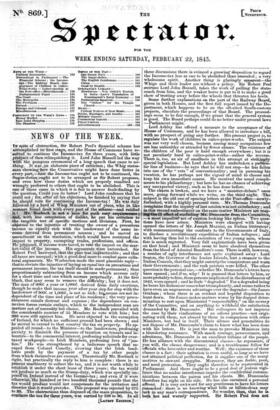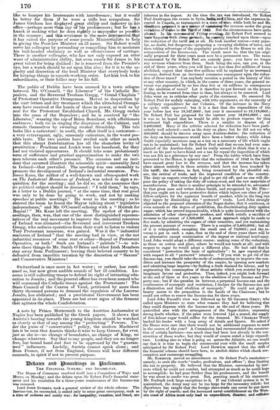NEWS OF THE WEEK.
IN spite of obstruction, Sir Robert Peel's financial scheme has accomplished itiiirst stage, and the House of Commons have re- solved to continue the Income-tax for three years with little prospect of then relinquishing it. Lord John Russell the way with the -poriapous ceremonial of a long speech that came to no- thing. It was tn elaborate piece of criticism ; the Whig states- man showing 'how the Conservative might have done better in . every part,—hã the Income-tax ought not to be continued, the - Sugar-duties ought not to be arranged as Sir Robert proposes, arid even how those duties which are properly- remitted are wrongly- preferred to other's that ought to be abolished. This is one of those cases in which it is fair to answer fault-finding by the question, Could you do better ? Lord John confesses that he could not ; for, after all his objections, he finished by saying that he should vote for continuing the Income-tax He was duly followed by a herd of Whig Ministers out of place, who in like manner found fault with every part of the scheme—and ratified it ! Mr. Roebuck is not a man for such easy acquieseence ; and, with less ostentation of dislike, he put his criticism to the tangible test of specific motions and divisions, First, he .objected to the injustice of- treating the owner of a precarious income as equally rich with the -landowner Of the same in- come derived from permanent sources ; and he Moved an -amendment: on the resolution, Which would have restricted the impost to property, exempting trades, professions, and offices. Heebp.‘osecl, if income were taxed, to rate the impost on the mar- ket-value 6T the iincome. His arguments tre untouched. Sir Robert Peel 1ndviered,:that the plan was impracticable, and that all taxes are uneqUa; Vith.a gOod-deal moreto combat mere colla- teral arguments. Mr. Warburton made the most plausible reply— that to obviate the injustice of laying an equal tax on precarious and permanent income, the tat itself should be made permanent ; thus proportionately subtracting from an income which accrues only for a short time and one which accrues perpetually. At the first blush, that may seem to remove the difficulty; but it does not. The man of 300/. a year or 1,000/. derived from daily exertions, though he make that income year after year step for step with the landowner of 300/. or 1,000/., is not so rich : hii„means are not in- dependent of the time and place of his residence ; the very preca- riousness entails distrust and expense ; the dependence on con- nexion forces certain outlays which to the independent man are matters not of necessity but Choice. Mr. RoebUcic prevailed with the considerable number of 55 -Members to vote with him ; but 263 were still against him. He next objected to the exemption :of Ireland, for which no sufficient ground'had been shown ; and
un he mimed to extend to that coti7 the tax on property. He ap- pealed all round—to the Minister—to the landowners, professing anxiety to diminish the pressure of taxation on tenants and la- boureito the commercial interest, professing solicitude for over- taxed workpeople—to Irish Members, professing love of "jus- tice." He was strengthened by a ludicrous -.speech that es- caped from Colonel Conolly, avowing that the Irish land- lords profit by the payment of a tax by other people from which themselves are exempt. Theoretically Mr. Roebuck is right, but practically the reply to him is complete : there is no present machinery to collect the tax, and it is not worth while to establish it under the short lease of three years ; the tax would net Produce so much as the Stamp-duty, which was specially im- posed on Ireland instead of the Income-tax ; and even if it weie otherwise, the hundred or two hundred thousand pounds that the tax would produce would not compensate for the irritation and disorder that it would provoke. This proposal was rejected by 275 to 33. The obstructions thus disposed of, the main proposition, to continue the tax for three years, was carried by 228 to 80. In all these discussions there is evinced a growing disposition to regard the Income-tax less as one to be abolished than amended ; a very wholesome spirit. Another thing is glaringly apparent—the Whigs and their leader are without a policy. Sir Robert Peel outruns Lord John Russell, takes the work of pulling the state- coach from him, and the weaker horse is put to it to make a good show of trotting away before the wheels that threaten his heels.
Some further explanations on the .part of the Railway Board, given in both Houses, and the first full report issued by the De- partment, which happens to be on the oft-cited South-eastern projects, elucidate the proceedings of that Board. The proceed- rags seem to be fair enough, if we grant that the general system is good. The Board perhaps could do no better under present laws —Parliament might.
Lord Ashley has offered a measure to the acceptance of the House of Commons, and he has been allowed to introduce a bill,
with no prospect of going any i further. H present project is, t
i
regulate the work of children n calico-print-works. The subjeet was not very well chosen, because among many occupations few are less unhealthy- or attended by fewer abuses. The existence of the children of the poor is hard enough everywhere ; but it is not peculiarly hard in calico-print-works--rather the reverse. There is, too, an air of smallness in this attempt at strikingly special legislation. But Lord Ashley has undertaken a pa/den- ier line of business—he says that he will not stop—he has fallen into one of the " ruts " of conventionality; and in pursuing his vocation, he has perhaps not the vigour of mind to choose and keep his own immediate course. He received the usual compli- ments to his philanthropy; but here he has no chance of achieving any unexpected victory, such as he has done before. The charm is broken, and we have a "monster-debate" once more, going forward while we write, on the third night. The subject is the old one of opening letters at the Pest-office—newly- furbished, with a highly personal torn. Mr. Thomas Dumcombe complains that the inquiry of last session was not satisfactory ; and in this second embroilment on the same matter Ministers are reap- ing the ill effect of excluding Mr. Duncombe from the Committee, —a most impoliti act of caution looking like spleen. Two ques- tions have now arisen. Ministers were charged with having opened the letters of Mr. Joseph Maizini, an Italian litterateur ; With communicating the contents to the Governments of Italy-, to disclose a revolutionary expedition- of Italian refugees ; and with having thus led to the execution of two young men whose fate is much regretted. Very full explanations have been given on that heed; and Ministers seem to have absolved themselves from the blood of Admiral Bandiera's sons. There is still, however, a residue of ugly interference not quite explained away : Lord Seaton, the Governor of the Ionian Islands, lent a steamer to the Italian Consuls, that they might outstripthe conspirators and warn their Governments; and the rash patriots were killed. The other questionis the pereonal one,—whether Mr. Duncombe's letters have been opened; and if so why? It is guessed that letters by him, or more probably to him, f;om persons implicated in the disturbances of 1842, were opened ; and he feels "degraded." For a degraded being he bears his dishonour somewhat triumphantly, and seems rather to have even an ungenerous advantage over the 'degrader—Sir James Graham ; whom there is an evident and hopeful disposition to hunt down. Sir James makes matters worse by his dogged deter- mination to rest upon Ministerial "responsibility," on the secrecy of the Committee, and on anything to withhold the satisfaction demanded by Mr. Duncombe. His colleagues do not improve the case by their vindications of an odious practice—not origi- nating with them, not abused by them in comparison with other - Ministers, but bad in itself. Their silence and generalities do not dispose of Mr. Duncombe's claim to know what his been done with has letters. He is just the man to provoke Ministers into a blundering resistance. With much courage perseverance, and adroitness, Mr. Duncombe is an excellent tribune of the people. -He has allianee'with the discontented classes—he represents, if you will, the classes dangercuses; and is a troublesome fellow for
officials who love order and routine. Well ; the existence of those classes is a fact : their agitation is even useful, so long as we have not attained political perfection, for it supplies one of the many motives to onward struggles. Moreover, they are feeble, poor, and need protection. They ought therefore to be represented in Parliament. And there ought to be a good deal of jealous vigi- lance that no undue interference impedes the confidential commu- nications between the patron and his clients. Mr. Duncombe therefore has right on Ins aide. He has also sustained a personal
affront. It is very awkward for any gentleman to have his letters ransacked : there is no knowing what bills or billets-doux may lurk in any man's correspondence. No wonder, then, that he is both hot and warmly supported. Sir Robert Peel does not like to hamper his lieutenants with interference; but it would be better for them if he were a trifle, less scrupulous. Sir James Graham has displayed great ability and industry in his office—perhaps more than any of his predeeessors, but he has a knack at making what he does rightly as unpopular as possible in the manner; and this weakness is the more detrimental-that it has suited the purpdse of some-pseudo Ministeiialitts to 'help in giving the Poor-law Minister an ill name. Sir Robert would serve his colleague by persuading or compelling him to moderate his bull-headed obstinacy as well as offensiveness of carriage. There is another colleague, who has not only exposed an utter want of administrative ability, but even excels Sir James in his great talent for being disliked : he is removed from the Premier's eye, but a watch should be set upon him also for it is to the sa- gacity and discretion of the head Minister that everybody looks for keeping things in smooth-working order. Let him look to his subordinates, or their follies may be his fall.



























 Previous page
Previous page